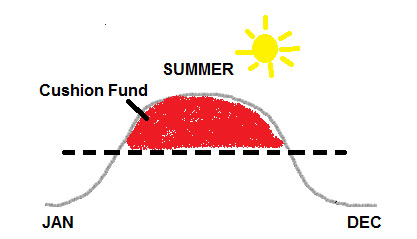Chances are that at some point in your life you will experience some type of financial setback. Indeed, emergencies are part of life. Businesses fail. Medical bills need to be paid. The house floods.
When you experience a financial setback, it can be difficult to get back into the swing of things. However, it's important that you do what you can to get back on top of your financial situation.
Deep Breath: What are Your Options?
Before you do anything, stop, take a deep breath, and evaluate your options. When you are in the moment, it is easy to panic and start making impulsive decisions about money. Before you make decisions, take some time to figure out what your options are.
- Can you arrange a payment plan? Does it have a reasonable interest rate?
- Is it possible to raise money another way, perhaps through selling some of your items or starting a side hustle?
- Have you prioritized your bills? If you have to let some slide, which ones will have the least impact on your situation?
- Are there community services, charities, or religious organizations that can provide you with help? Food pantries, or special heating programs, and other services can help you weather a storm.
- Would downsizing help? What services can you do without (cable, subscriptions, gym memberships, etc.)? Does it make sense to move into a smaller place?
- Can your extended family help?
- What is your last resort? If things are truly bad, you may need to resort to letting your home be foreclosed on, or trying to navigate your problems through bankruptcy.
In many cases, a combination of help and payment plans can help you get back on track. However, you need to make decisions after some thought. Most of the time, you can wait two or three days — or even longer — after a catastrophe or setback before you have to make a decision. Take your time and make a plan.
Preparation: The Best Way to Handle a Setback
Of course, there is no substitute for preparation. Careful preparation can reduce your exposure to the risk of a financial setback, although it might not completely protect you from all problems. There are three main things you can do to help your prepare your finances for a setback:
- Live below your means: One of the best things you can do is live below your means. This means that you take in more money each month than you spend. It's not just about budgeting so that you spend all your money. It's about making sure you have extra money, and that you aren't living up to your income. You want to have room to cut things out, if possible. Plus, if you are used to living less lavishly than you could, it's easier to cut out unnecessary spending.
- Purchase adequate insurance coverage: Adequate insurance coverage can help protect you from some costs. Auto, home, and health insurance policies can all reduce the amount of money that you pay out of pocket in a financial setback. Protect your assets, and you will be better prepared.
- Build your emergency fund: We all hear about how we should have an emergency fund — and it is important. Build up your emergency fund so that you can pay deductibles, pay bills, and take care of other financial problems during a setback.
What would you do in in a financial emergency?
 1. Get Something Uniquely Enjoyable
1. Get Something Uniquely Enjoyable
